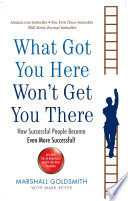

Self-awareness is the cornerstone of personal and professional growth. In this book, Marshall Goldsmith emphasizes that many successful individuals are unaware of the behavioral habits that hinder their progress. Self-awareness allows leaders to recognize their strengths and weaknesses, understand how their behaviors impact others, and identify areas for improvement. Goldsmith provides practical tools such as feedback from peers and mentors, which can help individuals gain insight into their behavior and its consequences. By fostering self-awareness, leaders can make more informed decisions, improve their relationships, and enhance their effectiveness.
Continue readingFeedback is crucial for growth, yet many high-achieving individuals often struggle to accept it. Goldsmith argues that soliciting and embracing feedback is essential for personal development. He introduces the concept of 'feedforward,' a proactive approach to feedback that focuses on future performance rather than past mistakes. This technique encourages individuals to seek constructive suggestions from others, which can help them identify specific behaviors to change. By actively seeking feedback and being open to change, individuals can break free from their old habits and foster a culture of continuous improvement.
Continue readingGoldsmith emphasizes that success in the past does not guarantee future success. The habits that propelled individuals to their current level may become obstacles as they strive for greater achievements. He presents a framework for changing habits that involves identifying specific behaviors to change, setting clear goals, and creating accountability. By focusing on small, incremental changes, individuals can gradually replace detrimental habits with more effective ones. This process requires commitment and perseverance, but the rewards can be significant in terms of personal satisfaction and professional success.
Continue readingEffective communication is a critical skill for leaders, and listening is a key component of this. Goldsmith highlights that many leaders tend to dominate conversations rather than engage in active listening. By practicing active listening, leaders can better understand their team's perspectives, foster collaboration, and build trust. This not only enhances team dynamics but also leads to more informed decision-making. Goldsmith encourages leaders to ask open-ended questions and genuinely consider the input of others, which can lead to richer discussions and innovative solutions.
Continue readingStrong relationships are foundational to effective leadership. Goldsmith stresses the importance of nurturing relationships with colleagues, subordinates, and mentors. He shares strategies for building rapport, such as showing appreciation, being present, and demonstrating empathy. By investing time and effort into relationships, leaders can create a supportive work environment that encourages collaboration and fosters loyalty. This relational approach can lead to increased engagement, productivity, and overall organizational success.
Continue readingGoldsmith points out that many leaders struggle to admit when they are wrong or to apologize for their mistakes. He argues that a sincere apology can be a powerful tool for rebuilding trust and repairing relationships. By acknowledging their shortcomings and taking responsibility for their actions, leaders can demonstrate humility and integrity. This not only helps to mend damaged relationships but also sets a positive example for others in the organization. Goldsmith provides guidance on how to deliver an effective apology, emphasizing the importance of sincerity and accountability.
Continue readingThe journey to becoming a more effective leader is ongoing. Goldsmith encourages readers to adopt a mindset of continuous improvement, recognizing that growth is a lifelong process. He emphasizes the importance of setting new goals, seeking new challenges, and remaining open to learning. By embracing a growth mindset, leaders can adapt to changing circumstances, stay relevant in their fields, and continue to inspire and lead others. Goldsmith's message is clear: success is not a destination but a journey, and those who commit to continuous improvement will ultimately achieve greater fulfillment and success.
Continue readingThe reading time for What Got You Here Won't Get You There depends on the reader's pace. However, this concise book summary covers the 7 key ideas from What Got You Here Won't Get You There, allowing you to quickly understand the main concepts, insights, and practical applications in around 22 min.
What Got You Here Won't Get You There is definitely worth reading. The book covers essential topics including The Importance of Self-Awareness, The Role of Feedback, Changing Habits and Behaviors, providing practical insights and actionable advice. Whether you read the full book or our concise summary, What Got You Here Won't Get You There delivers valuable knowledge that can help you improve your understanding and apply these concepts in your personal or professional life.
What Got You Here Won't Get You There was written by Marshall Goldsmith.
If you enjoyed What Got You Here Won't Get You There by Marshall Goldsmith and want to explore similar topics or deepen your understanding, we highly recommend these related book summaries:
These books cover related themes, complementary concepts, and will help you build upon the knowledge gained from What Got You Here Won't Get You There. Each of these summaries provides concise insights that can further enhance your understanding and practical application of the ideas presented in What Got You Here Won't Get You There.